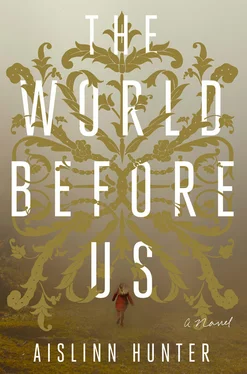When Jane gets back to the inn with a tray of coffee and a bag of croissants she had to drive to the next village to find, Blake is drying off from his shower and Sam is standing by the door because he hasn’t been let out yet.
“The police were here for you.”
“Sorry?” Jane shakes her head.
“And the room charges were slipped under the door, which I suppose means you’re leaving.” Blake picks a card up from the tea tray. “A Constable Avison? I said you were out for the day because I didn’t know what else to say. They hung around for half an hour and made a bunch of calls. You just missed them.” He is matter-of-fact and distant. “I think I have this right.” He hands her the card. “Please tell Ms. Standen that we strongly encourage her to call us.”
Jane doesn’t say anything. She doesn’t know where to start.
Blake pulls his jeans on. “On the plus side it appears that your name really is Jane.”
“Did they say what they wanted?”
Blake laughs, but it’s not a laugh that she knows. “No. Probably because they could see how badly I wanted to know, standing there in my fucking boxers and everything.”
“I don’t work for the Trust.”
He pulls his T-shirt on over his head. “Yeah, I get that now. I’m not a total fucking idiot.”
Because she doesn’t know how else to do it, Jane closes her eyes and blurts out: “I slapped the father of the girl who went missing at a public event last week and then I took off from my job at a museum in London and didn’t tell anyone where I was going. I’m sorry I lied.”
When she opens her eyes he is putting his boots on. Once they’re laced he says, “Sam needs to go outside,” and grabs his jacket off the chair and walks out, slamming the door behind him.
Jane puts the constable’s card in her pocket and packs her things. Maureen stiffly takes the keys, deducts the deposit from the amount owing with quick jabs at her calculator and then pauses mid-stroke while she’s writing out the receipt. Jane wonders if the constables gave away the fact that “Helen” was not her real name.
“I’m sorry for any trouble,” Jane says.
Maureen glances over to her husband, who is leaning against the door jamb with his arms crossed. He looks angry, as if Jane has disappointed him too — as if she’s made them both complicit in some kind of wrongdoing.
Sitting in the car, Jane cradles her head in her hands and tries not to cry. She opens the glovebox to have something to do, rustles through it. There’s an old parking permit from Lewis’s last lab, a yoga schedule, the Mercedes manual from 1970. She pulls the manual out and brings it to her nose, wishing it might still carry the scent of her grandparents, some trace of being a child.
Walking up the avenue that divides the great lawn of Inglewood house, Jane tries to compose herself. She can still feel the heat of her face, the knot in her stomach that won’t go away. What could have been days or even weeks has suddenly turned into a day maybe, or into hours. She looks over her shoulder at the clipped green expanse of the lawn to see if anyone is following her but there’s only the line of shrubs and bushes at the edge of the property, the sculpted heads of marble horses peeking through the gaps in the evergreen, a cluster of parked trucks and cars by the road.
To calm herself down Jane imagines Herschel Morley, Charles Leeson and the young woman who may or may not be Nora Hayling walking out of the Whitmore and across eleven miles of forest and fields to arrive here: a great lawn bordered by hedges and what would have been, at night, the eerily bright marble of rearing horses in the recesses between the hewn trees.
It’s possible that a census will place Nora in time, locate where she lived before and after the Whitmore, identify family, suggest what happened. It’s possible that when N left Herschel and Leeson on the steps, she did something as simple as head down into the village, knock on her parents’ door and go home. Still, it’s the other possibilities — infinite ones — that make Jane anxious to read Prudence’s diaries, to find some note that might finalize the equation, draw an unbroken line between Inglewood House and the Whitmore, between Nora Hayling and N.
Prudence Farrington’s diaries range from 1870 to 1910, although within that span entire years are missing or lost. As Gwen takes five volumes out of the file cabinet, Jane knows to expect gaps, missing weeks or months due to bouts of illness or travel. Gwen confesses that she has only read the diaries once so far, and not deeply, though she remembers being surprised that the two years after George’s death were so scantly recorded. Jane has seen this before in her research at the Chester: the writer mourning or self-censoring or turning instead to black-edged letters. Sometimes, too, the executor intervenes: tearing out pages or burning whole books to expunge impassioned feelings, accidental indiscretions.
Gwen points to a tall-backed chair at the other end of the dining room table where a book support has been set up and tells Jane that she can work there. Then she pulls a pair of rubber gloves out of a box sitting on what must have been an original window seat — its cushion the same dusky pink as the cherry blossoms on the Oriental wallpaper. “I’ve actually met William Eliot,” Gwen says, as if just remembering Jane’s mention of him yesterday. “His wife and daughter rented a cottage up here for a month last year when he was doing some research for his book. I have a daughter Mina’s age and they played a few times. He seems like a lovely man.”
Jane is working her way through the spring of 1877 a few hours later when Gwendolyn gets up and apologizes. She has to fetch some lunch, and there isn’t a fridge or microwave working in the house yet so she’ll be walking down to the pub. She stands for a moment at the end of the table and Jane realizes this means she has to leave as well — the material can’t be left unsupervised, and even though Jane is usually the one supervising, she doesn’t properly belong here.
Gwendolyn puts the diaries back into the file cabinet and locks it, then locks the dining room door behind them with a skeleton key. “I’ll only be twenty minutes or so.” She offers Jane the option of waiting in the library, warning her to avoid the man supervising the movers as he’s in a bit of a mood because one of the workmen dropped a Queen Anne side table. “You’re welcome to look at the books on the shelves. We’re just in the process of cataloguing them.”
Because the movers are traipsing in and out of the library — once hauling a wood bench so large that it takes four of them to carry it — Jane stands in the corner out of the way, near the brocade curtains, and surveys the titles the Trust is placing back on the shelves. Most of the books concern botany, geography and history, their spines splitting or warped, though they would have been relatively new when George purchased them, probably to keep current with the scientific discoveries and political boundaries of the day. She likes this about George — that he must have been less concerned with having a gentleman’s library than with the importance of the material in the books themselves. In a row of volumes that are mostly verse, Jane pulls out a tatty copy of Virgil, then a lightly worn blue calfskin Milton, then a book with a torn cover and no discernible title save for an illustrated embellishment of a hive of bees. She opens it up to the first leaf: To my muse. I see what I see .
“In the razed field,/in the cusp of its wealth,” says the poet, and Cat claps and Herschel tweeps . “We lay on the rough skin of earth,/and loved with our mouths.” The poet leans over Jane’s shoulder, reading as she is reading: “To speak and name the field song,/to pluck wonder like a flower,/is to waver between worlds:/the gods and ours.”
Читать дальше












